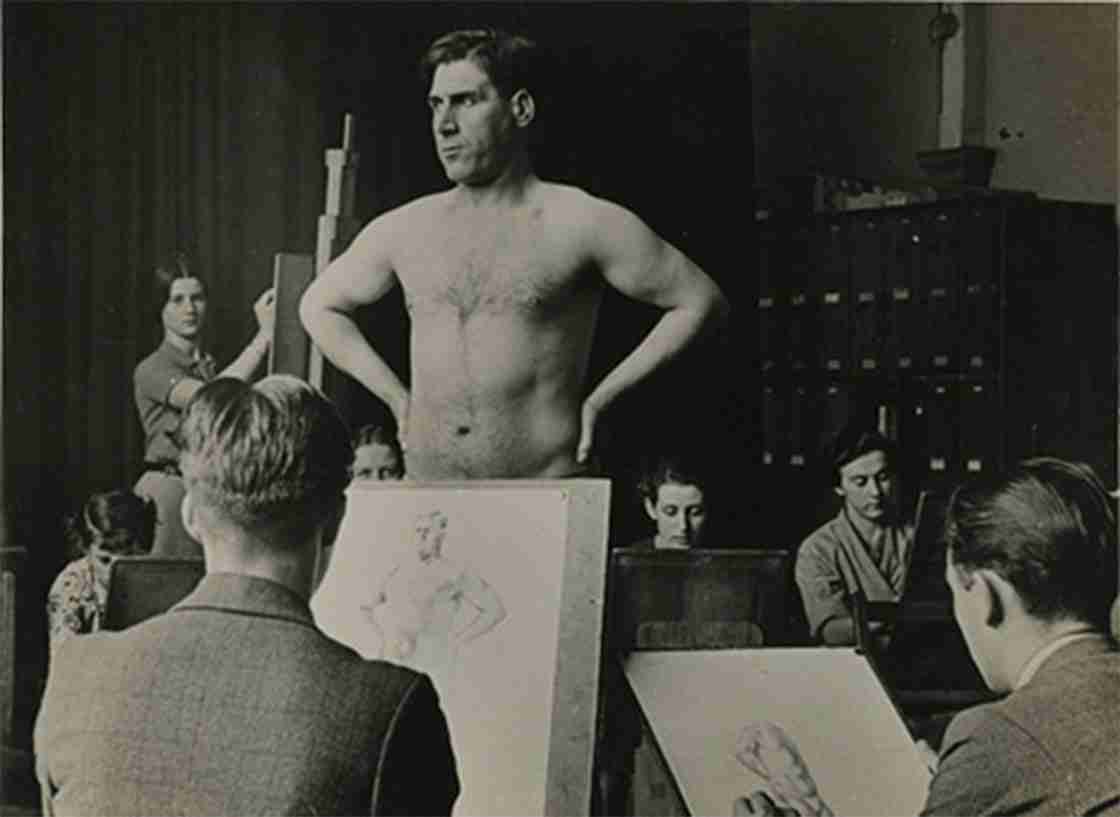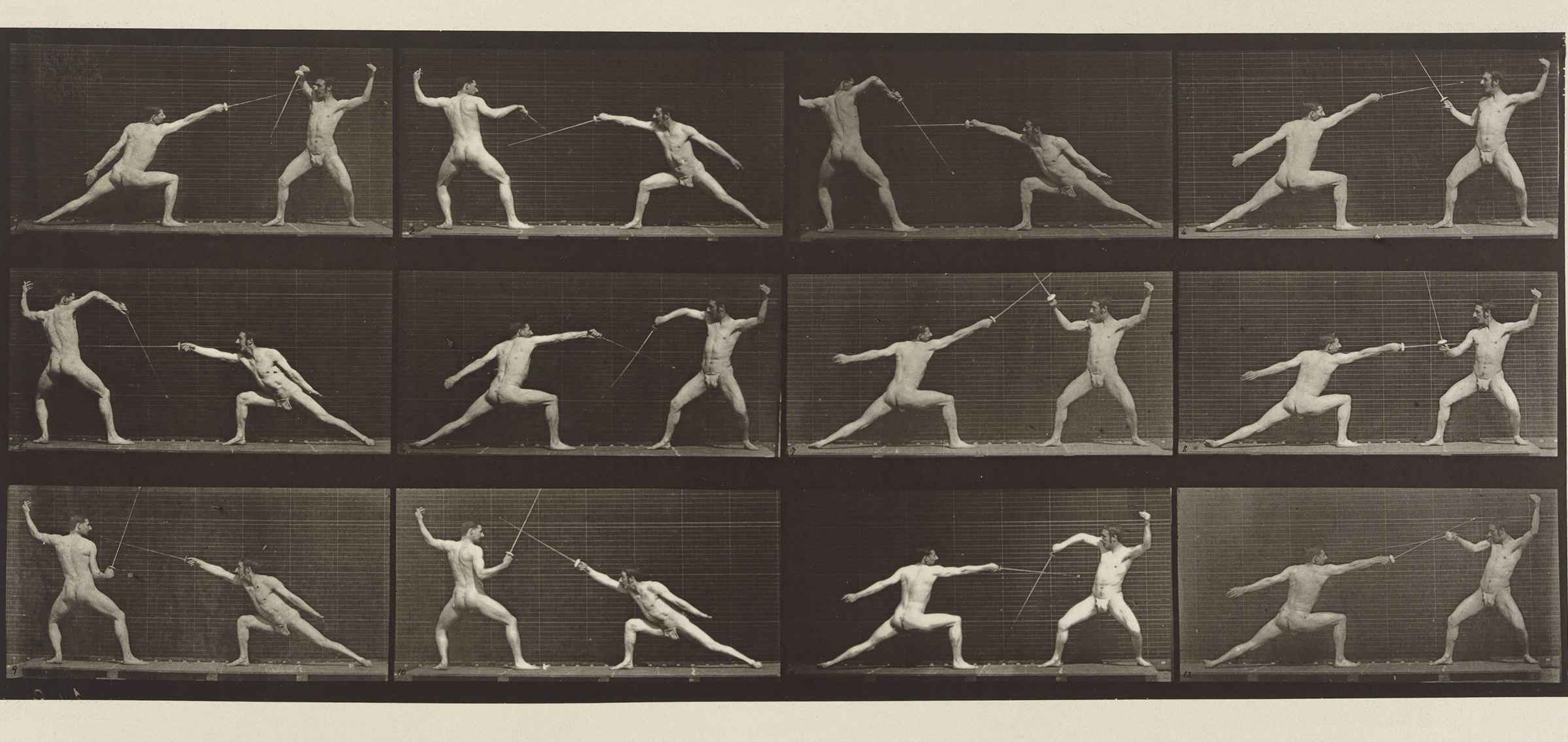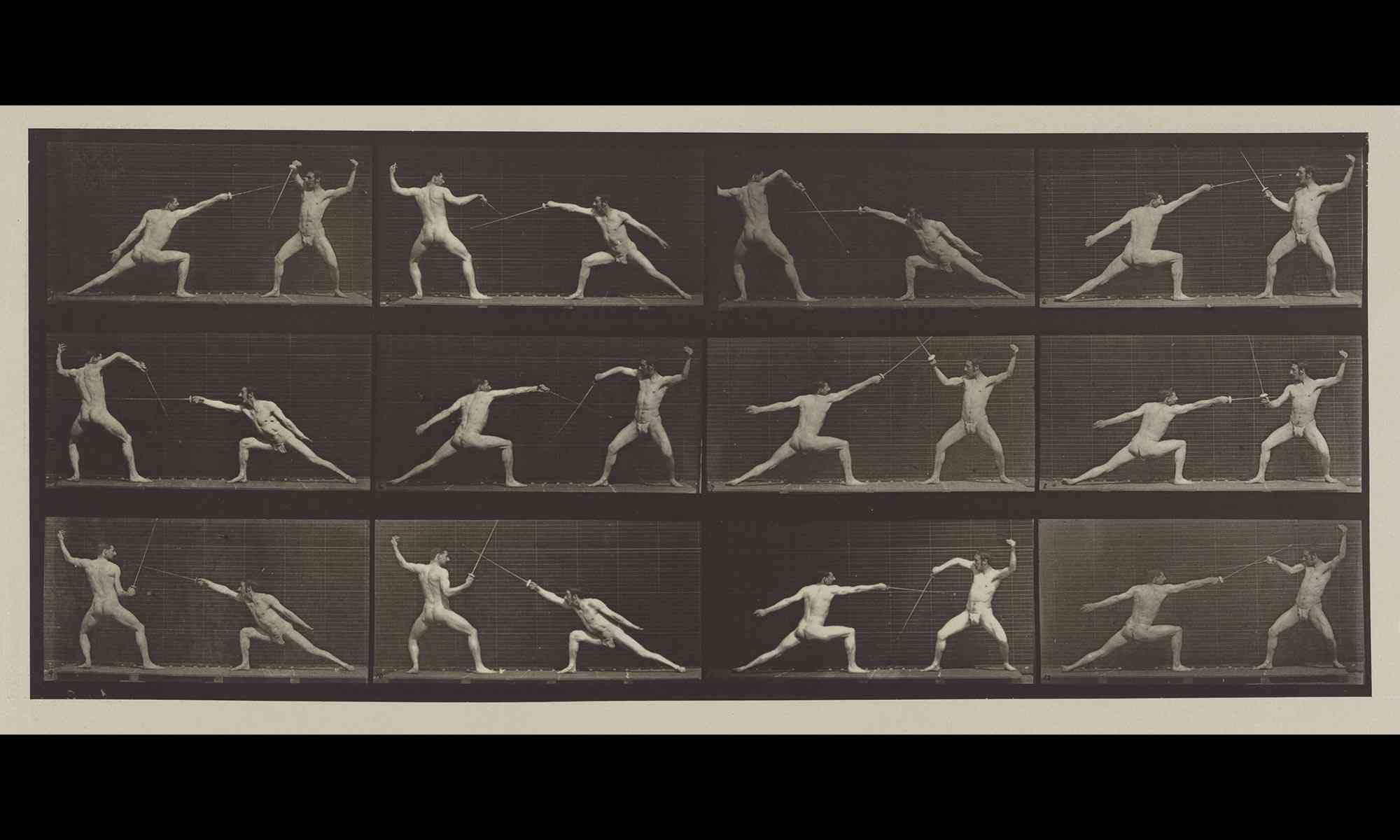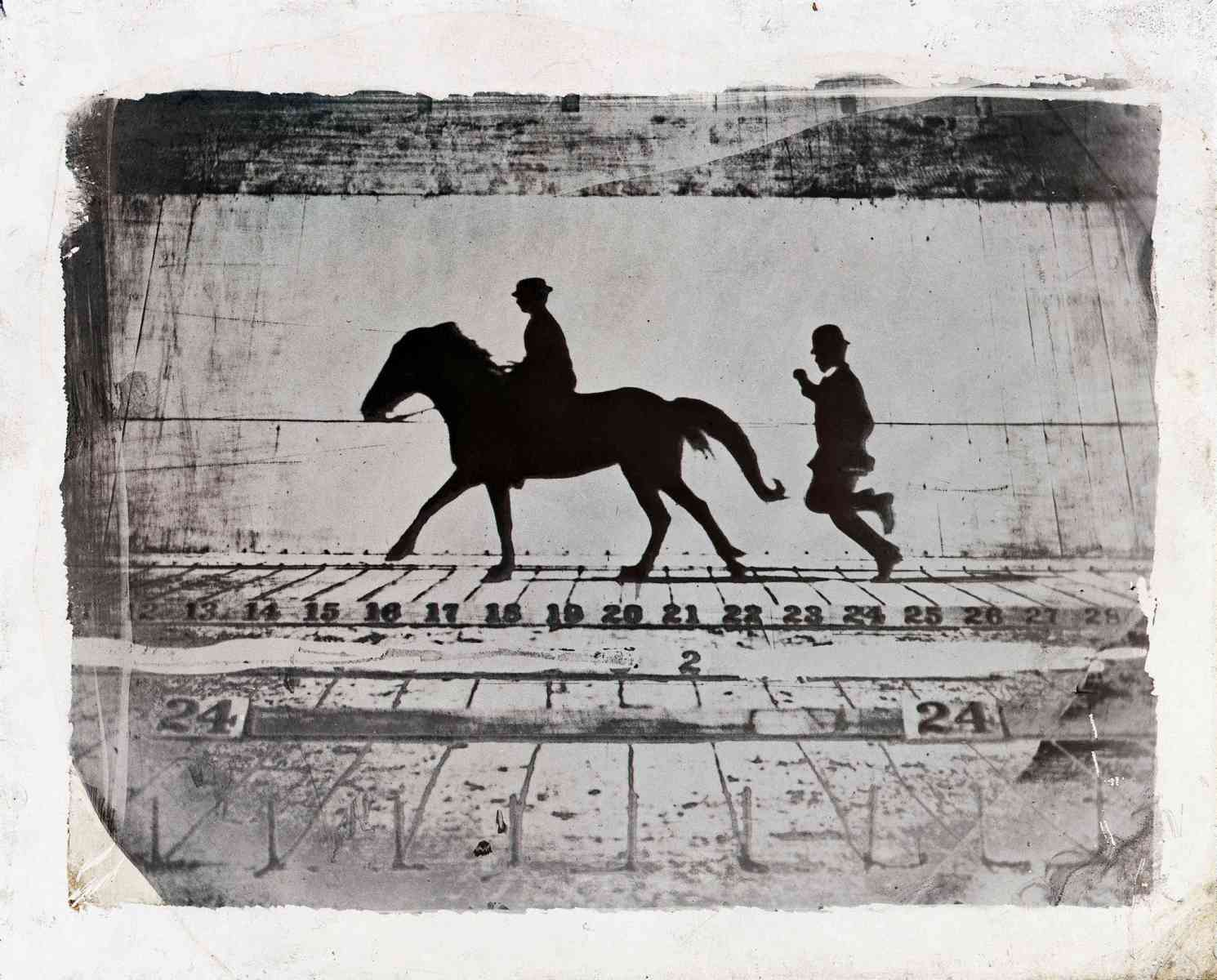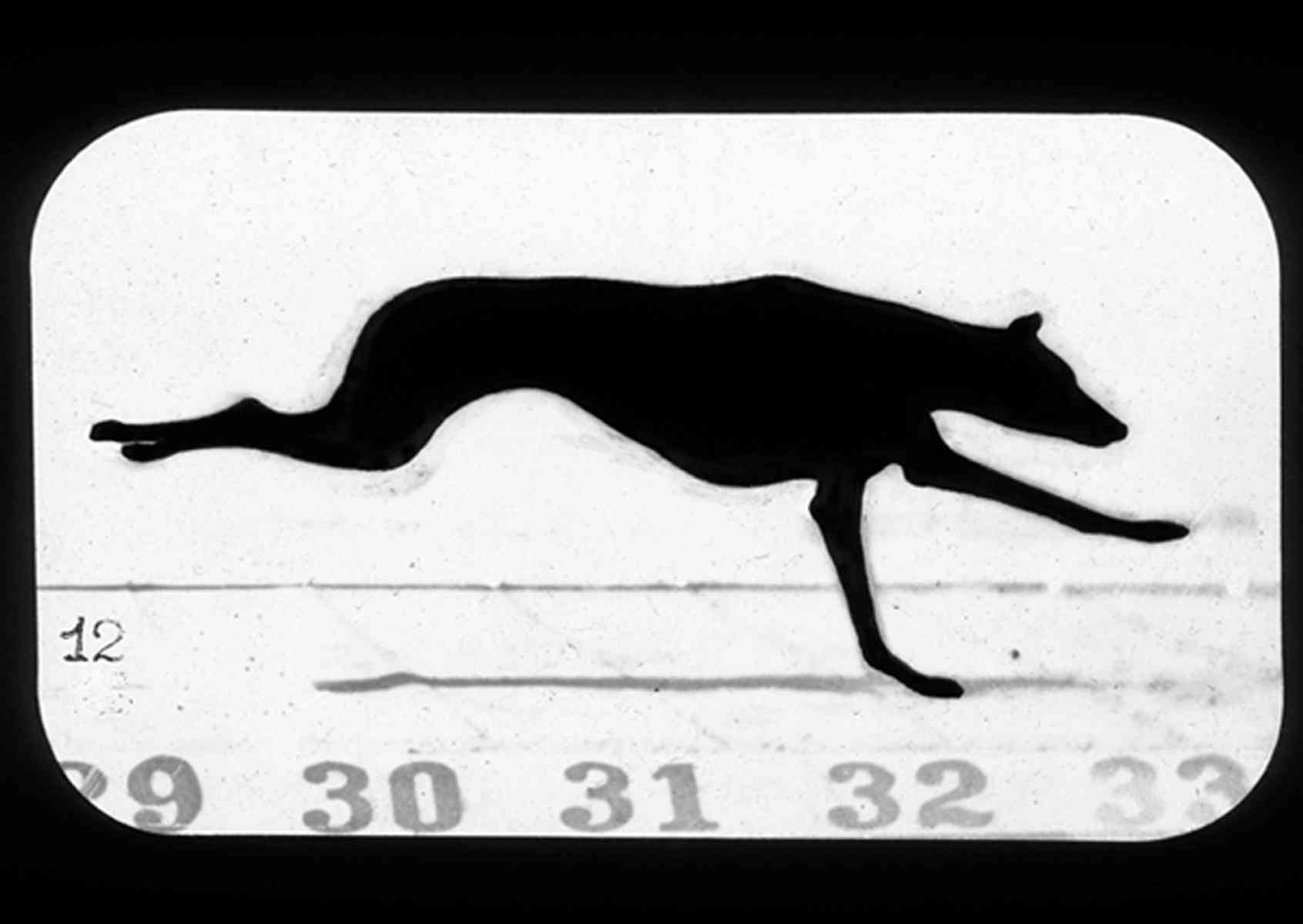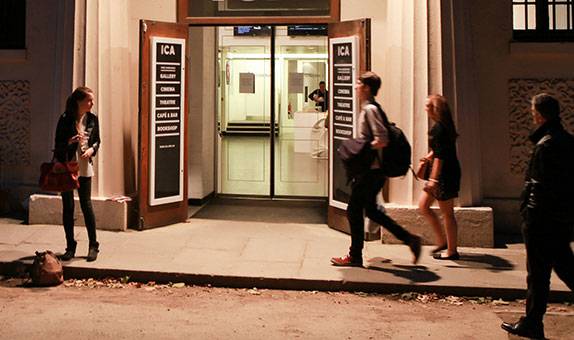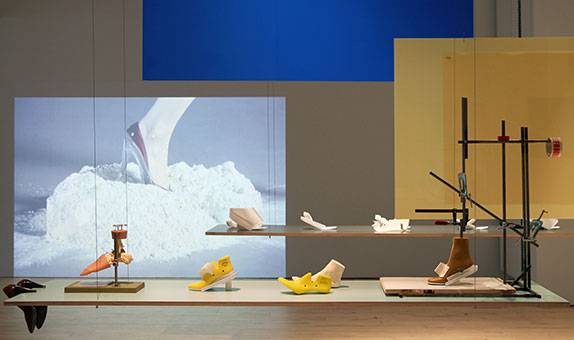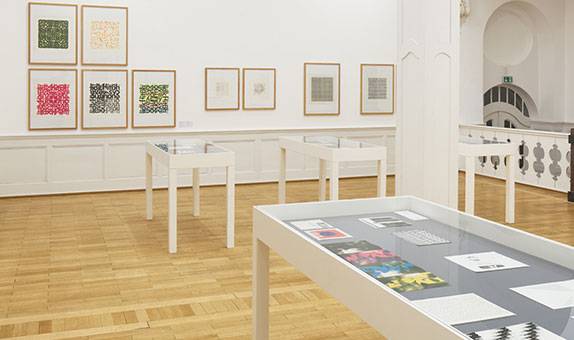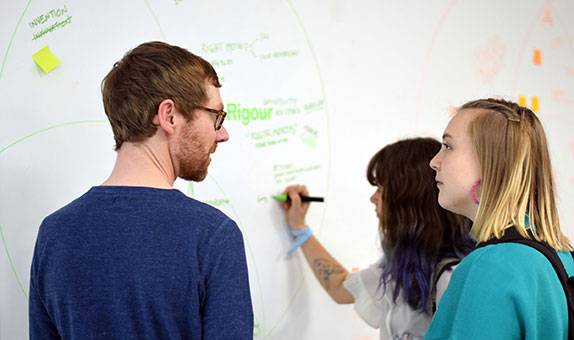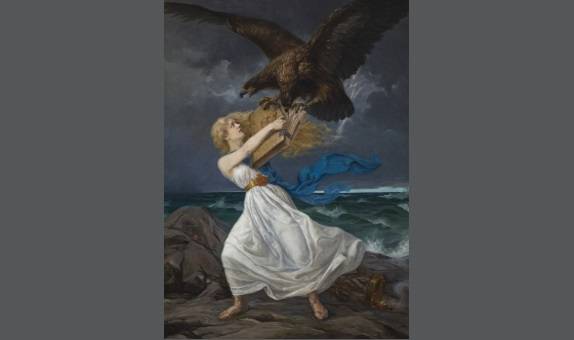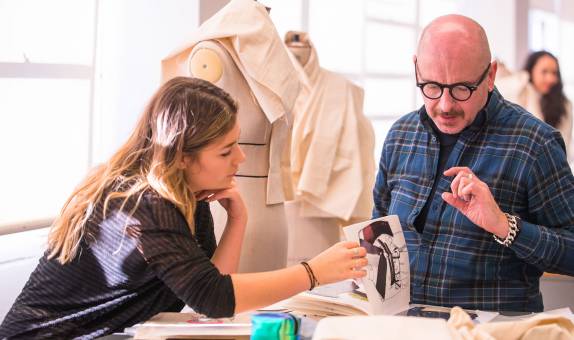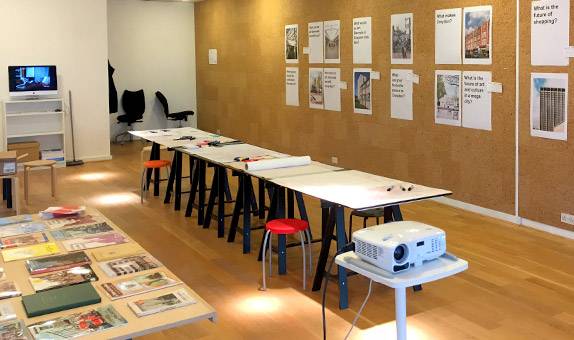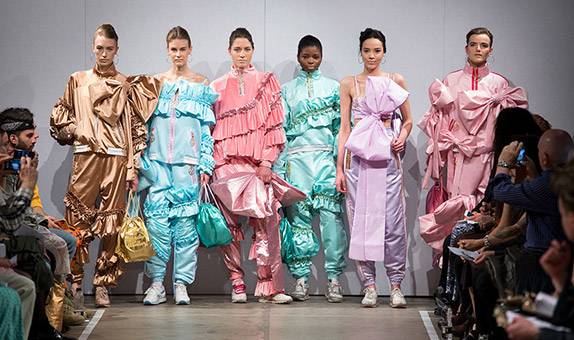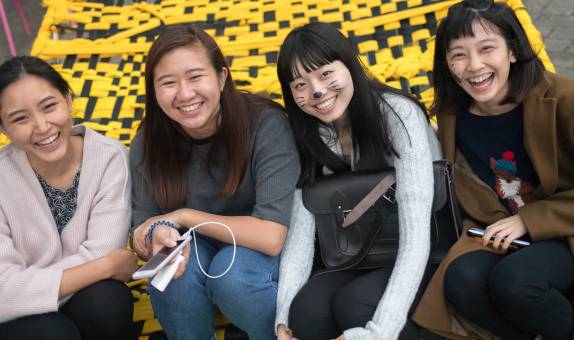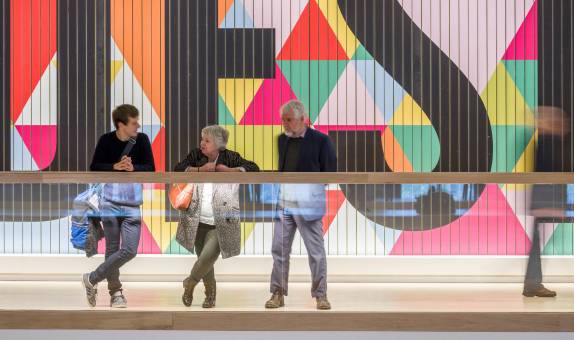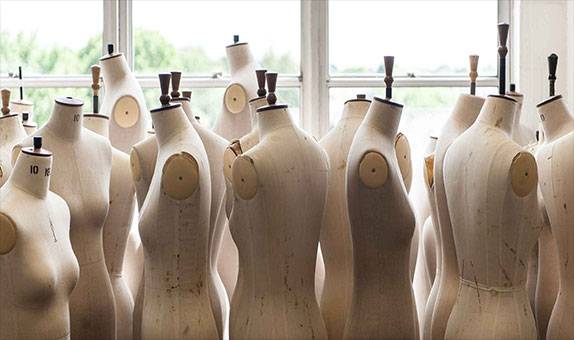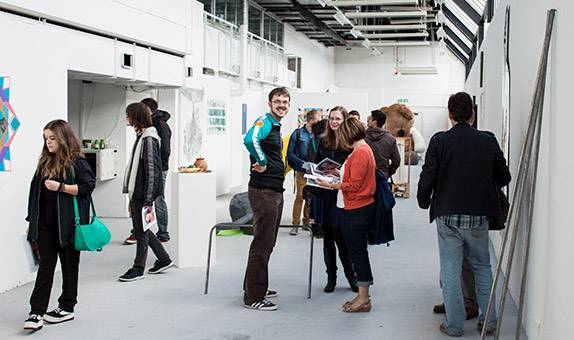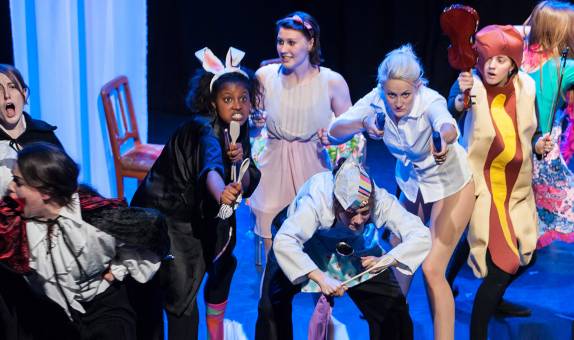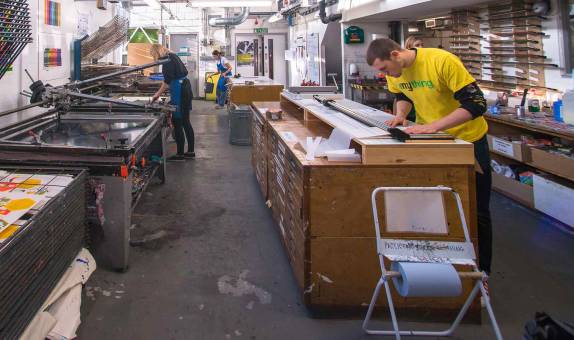Exhibitions, conferences and events
Making it Home: Re-Configuring Migrant Homemaking Together
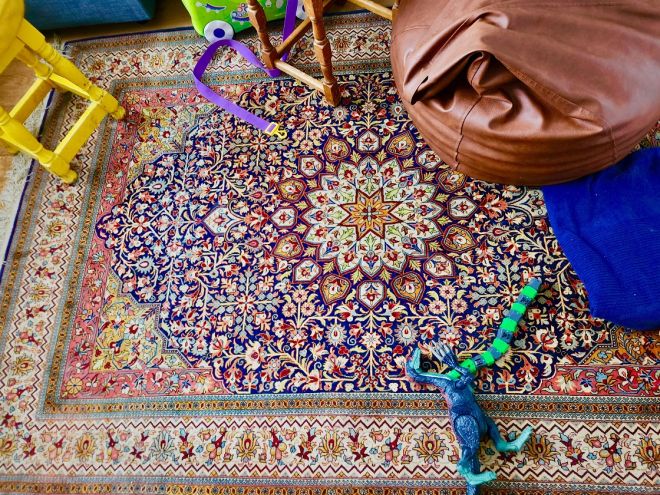
Date: Wednesday 22 May 2024, 9.45am–6pm
Venue: The Courtyard, Town House, Kingston University, Penrhyn Road, Kingston upon Thames KT1 2EE
This is an open event that focuses on how we can intervene to challenge dominant narratives and perceptions of migration and integration by presenting and discussing new ways of re-thinking and re-configuring migrant and refugee homemaking amidst divergent integration politics in Denmark, Sweden and the UK.
Centring on migrant and refugee homemaking in the intertwined areas of policy-making, art, and the making of home in the every-day, the event presents a series of innovative aesthetic methodologies resulting from the MaHoMe project, "Making it Home". Led by Kingston University, in partnership with Lund University in Sweden and Roskilde University in Denmark, the project worked with NGOs and migrant and refugee participants as co-researchers.
The programme has a diverse range of formats, including interactive talks, screenings, visual presentations, panel discussions, a Long Table, an accompanying exhibition and participatory installation.
The events are free and all are welcome. Please book a place. Booking to attend is essential for catering purposes.
For further information about this event please email us.
The Event is supported by NordForsk as part of "Making it Home: An Aesthetic Methodological Contribution to the Study of Migrant Home-Making and Politics of Integration - MaHoMe, project number 94893"
Image credit: Lina Hakim, 2023.
Speakers for "Making it Home"
Antonin Artaud: New Critical Reflections
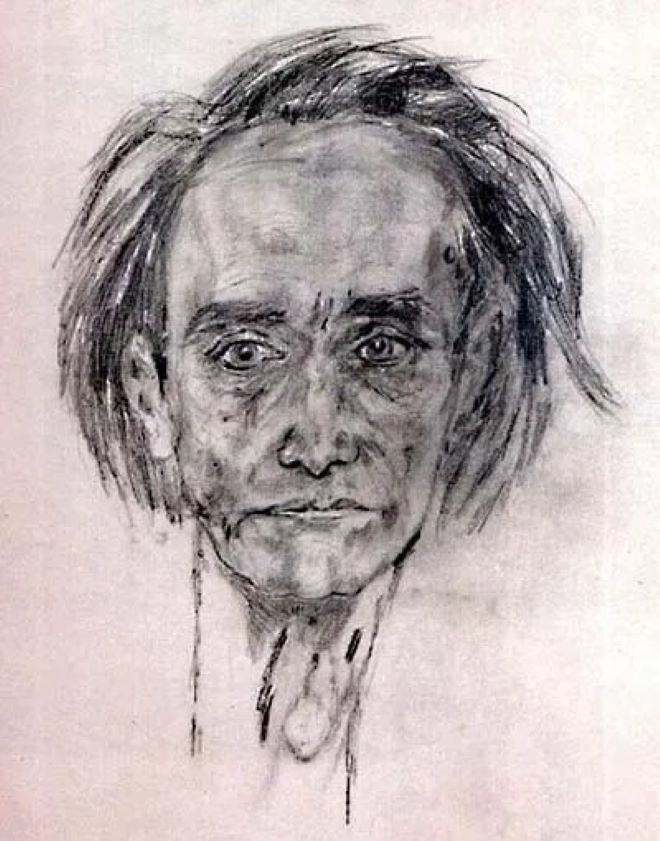 Call for papers: Deadline 29 February 2024
Call for papers: Deadline 29 February 2024
Conference Dates: 30 to 31 July 2024
We are extremely pleased to present a call for papers for our forthcoming conference and performance event celebrating the life and work of the writer, poet, dissident surrealist and founder of the Theatre of Cruelty, Antonin Artaud.
Since 2018, the publishers Infinity Land Press and Diaphanes have been publishing translations of Artaud's final and previously unpublished works, and his letters from Ireland. These publications have been exposing Artaud to a new readership as well as extending and completing the most extraordinary and troubling corpus of work of the 20th century.
This international conference aims to bring together scholars of Artaud's work, of experimental and transgressive theatre, film, performance, music and literature, as well as performers, artists, filmmakers and musicians in a major two-day event.
The event will encompass two days of conference presentations from across many disciplines, which will exhibit new research about Artaud, his work and legacy. It will take place in Kingston University's RIBA Stirling award-winning Town House Building / Library (Penrhyn Road Campus), in south-west London.
Call for papers
We invite you to submit abstracts (one-page maximum please). Papers should last NO MORE than 20 minutes max. We especially invite female researchers, as well as new and early researchers, scholars and practitioners to submit proposals.
To see a list of topics you are invited (but not limited) to submit abstracts on, click the yellow expandable box below.
Please submit abstracts in the first instance to the conference conveners Dr Matthew Melia or to Professor Stephen Barber by 29 February 2024.
Conference details
- Dates: 30 and 31 July 2024
- Venue: Kingston University, Town house Building (Penrhyn Rd Campus)
There will be a nominal charge (£10) for attendance at the entire conference.
Image: Antonin Artaud, self-portrait, December 1946
Teaching Graphic Design History in/of the Arab World: Narratives and Practices
Thursday 29 February / Friday 1 March 2024
Graphic design in the Arab world has been shaped by colonial legacies that continue to influence both its teaching and practice. This research symposium aims to explore this issue by bringing together scholars, educators, and practitioners to discuss the decolonisation of graphic design education. It aims to provide a platform to reflect on challenges and opportunities, and consider approaches to the study of graphic design in the Arab world with a focus on the cultural, social, linguistic, and historical contexts of the region.
This event is organised by Yasmine Nachabe Taan, Lebanese American University, Beirut and Trustee of the Design History Society, and Lina Hakim, Senior Lecturer and member of the Visual and Material Culture Research Centre at Kingston University, London.
This online research symposium is composed of two panels and takes place over two days as follows:
Day 1: Thursday 29 February 2024
Panel 1: Narratives (stories, definitions, timelines, archives)
- Dina Benbrahim – Inside and outside the classroom: an anti-racist and feminist approach to design histories
- Haytham Nawar – A history of histories: the stories/challenges behind writing a book about "Arab graphic design history"
- Huda Smitshuijzen AbiFares - Uncovering the multi-faceted history of typography in the Arab world
- Yasmine Nachabe Taan – A transition from global to glocal: breaking hierarchies in the teaching of history of graphic design
Day 2: Friday 1 March 2024
Panel 2: Practices (references, knowledge, language, dissemination)
- Jana Traboulsi – Centre and margins in design history: reflecting on Kitab al Hawamesh
- Moe Elhossieny - Archives of the shadow: institutions, collectors, dealers and heirs
- Basma Hamdy – The myth of complexity in the Arabic script
- Lara Balaa – A methodological framework for studying geographies of graphic design
[Image: Jana Traboulsi, Kitab Al Hawamesh (The Book of Margins) [spread], 2017]
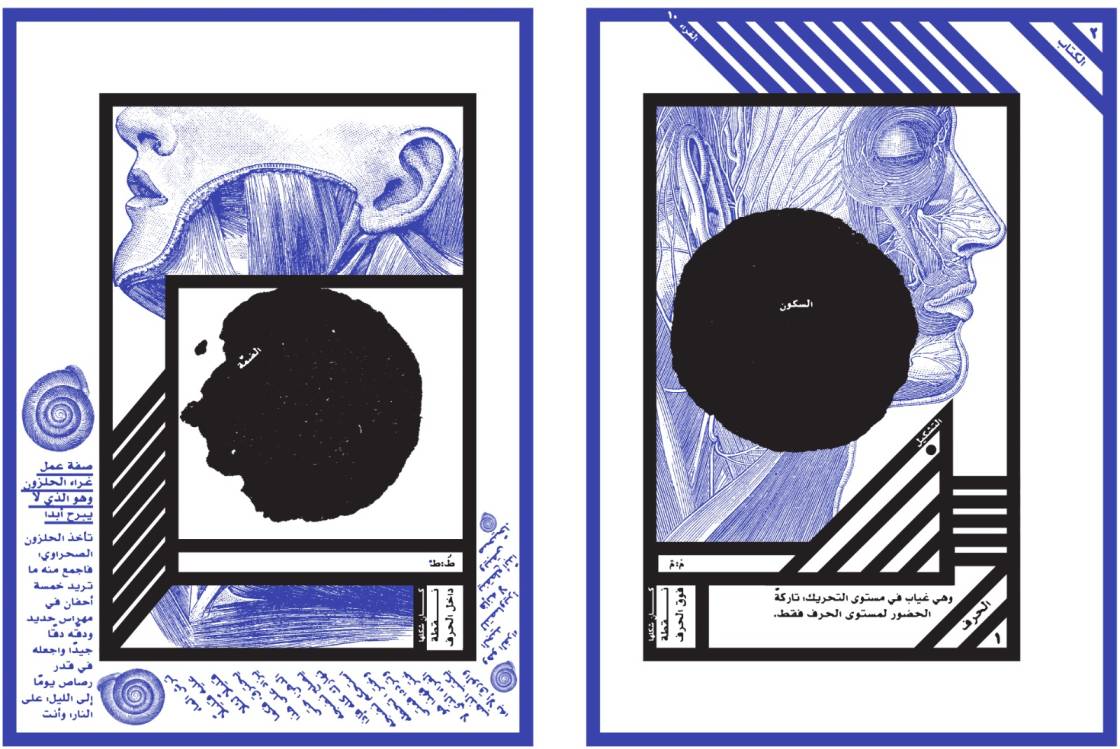
Past events
Explore Kingston School of Art's past exhibitions, conferences and events:
- Experimental Archives Symposium
- From Tallinn to Tbilisi: Art across boundaries in the age of empire
- Regenerative Listening Symposium
- Ken Russell Book Launch and Symposium
- Moving Muybridge: Transatlantic Dialogues
- Artists' Homes in Kingston: Gordine and Muybridge
- Creativity in the Lockdown Home: Crafting, Parenting, Researching
- Art School Archives
- Women's Studio Museums
- Curating Home
- Between the Visible and Invisible
- The Echo of Your Departures
- Artistic Research Will Eat Itself
- ARTAUD
- Berlin Bodies – Anatomising the Streets of the City
- Eadweard Muybridge in Kingston, 1894–1904
- Thinking through Making: 140 Years of Kingston School of Art
Experimental Archives Symposium
Friday 26 January 2024
12:30 – 4:40pm
Townhouse, Kingston University
Many staff members and PhD students in the Kingston School of Art are developing a wide range of research projects around the issues and challenges of Archives, from historical archives such as the recently-arrived Muybridge Collection at Town House to contemporary, international, experimental archives.
This innovative research extends from fine art and filmmaking projects that redefine and question archival resources and their status, to more familiar archival projects across, for example, dance history, art history, architectural history and other areas.
Archives can be transitory and fragmentary or even imaginary entities, carried around by artists or writers or creators in suitcases or bags or on phones, as well as accumulated collections of working materials that require an archival ‘space'. In many ways, in the contemporary moment, the status of archives now needs to be investigated and reinvented.
The Visual and Material Culture Research Centre in the Kingston School of Art held an afternoon symposium to discuss ongoing projects engaged with archives, further details can be found here.
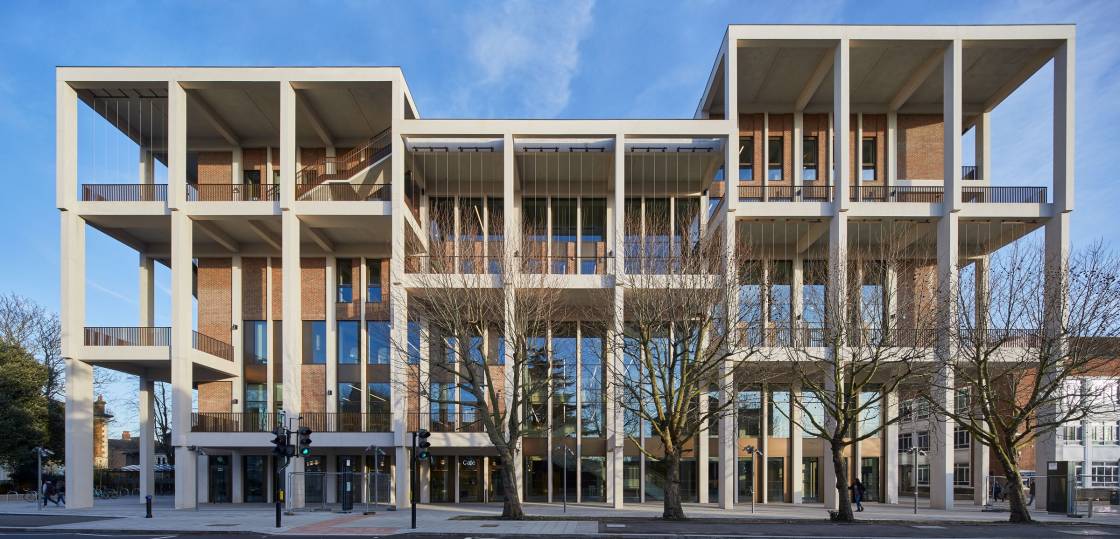
From Tallinn to Tbilisi: Art across boundaries in the age of empire
Event series: January to October 2023
Through the 19th century, until the eventual collapse of the Russian Empire in 1917, artists in territories under imperial control, such as Poland, Finland, Ukraine, the Baltics, the Caucasus, Central Asia and others, increasingly began to explore questions of national identity in response to hegemonic and Russo-centric narratives advanced by the tsarist regime.
In this seminar series, speakers examine art production in key centres of activity beyond St Petersburg and Moscow to present perspectives from across the Empire. Exploring a range of topics, such as art education, travel, national revivals, and women's advancement, they consider the ways in which artists negotiated ethnic and territorial identities, advanced their professional careers, and recalibrated their art-making in response to imperial rule.
Image: Edvard Isto, Attack, 1899, oil on canvas, National Museum of Finland, Helsinki
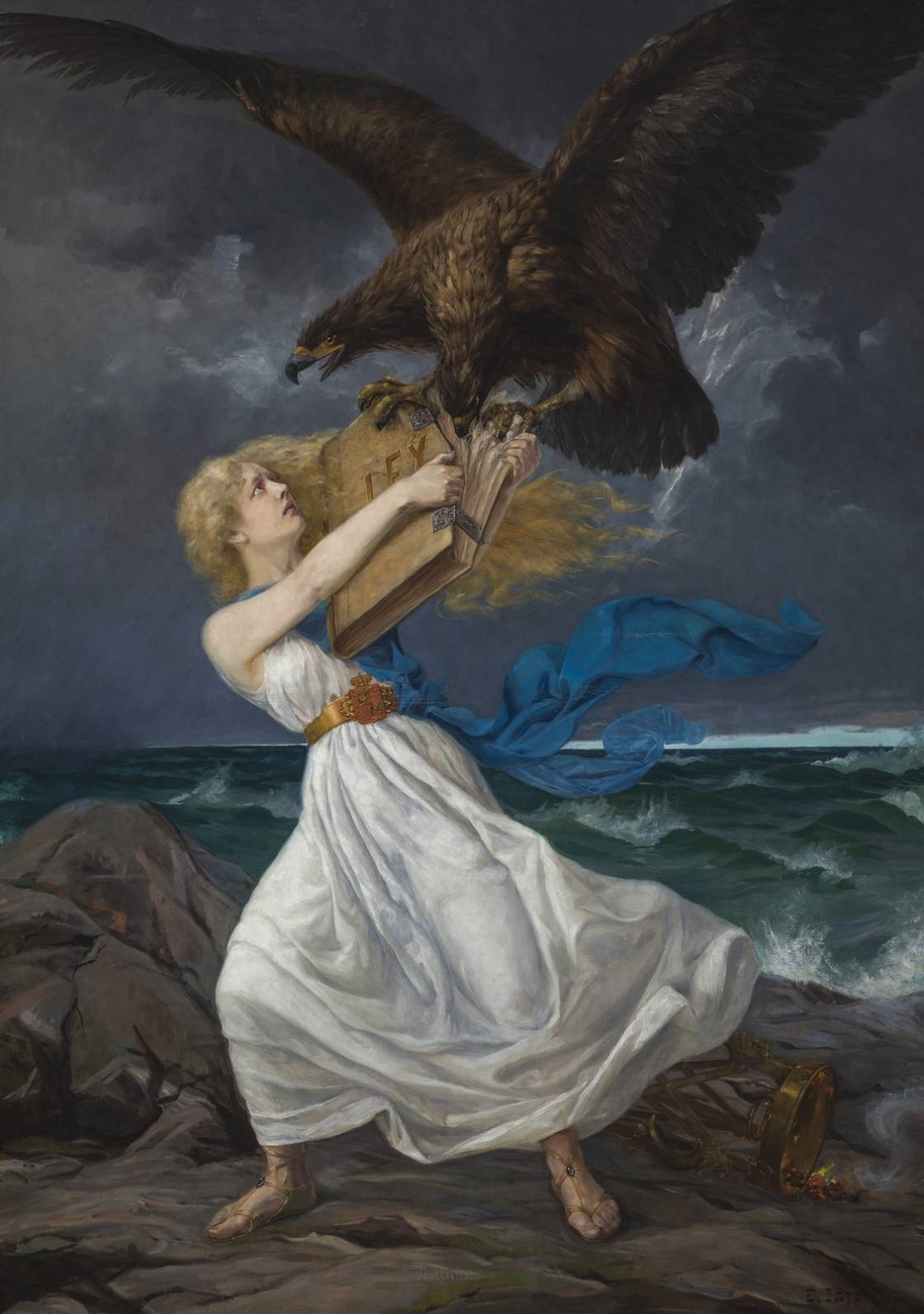
Regenerative Listening Symposium: 20 July 2023, 10am – 6.30pm
A collaboration with the Listening Academy
Co-convened by Dr Lucia Farinati (Kingston School of Art) and Brandon LaBelle (The Listening Biennial)
Speakers: Leah Bassel (Coventry University), Brandon LaBelle (The Listening Biennial), John Levack Drever (Goldsmiths University), Melania Calestani (Kingston University), Laura E. Fisher (CEO of Traumascapes), Lucia Farinati (Kingston University), Maddalena Fragnito (Coventry University), Johanna Motzkau (The Open University), Luis Sotelo Castro (Concordia University, Montreal), and Soundcamp.
This symposium explores the cross-cutting role of listening in art, activism and social care and its potential to facilitate change in times of crisis. Understanding listening as a form of solidarity and a labour of care, the symposium explores the cross-pollination of political and creative practices that intersect with socially engaged art, transitional justice, healthcare research and cultural activism.
The significance of this study day consists in an inter-disciplinary methodology and perspective on listening which will connect research on this subject from political theory and clinical psychology to performance, visual art and sonic studies.
Listening has long been considered as a cultural, political and clinical activity that can be practised, learned and cultivated. In socially engaged art, the focus on dialogue and audience participation has been a listening-centred practice, giving voice to marginalised subjects. In 1970s practices of feminist consciousness raising, new protocols for group listening and speaking were recognised as a powerful political action and a vital form of political therapy. In all forms of talking therapy listening has been recognised as the core skill of professional training. But, in moments of crisis (financial, ecological, Brexit, Covid, Ukraine…) what is the role of listening and why might listening matter? What happens when verbal communication or dialogue, understanding and reciprocity, compassion and empathy are under threat due to isolation, lack of care and hope?
This symposium aims to re-contextualise distinct traditions of listening in politics, social and creative practice and analyse when and how their potential for social transformation is blocked at the point that a dramatic shift in perspective - without losing the attention (the listening) - becomes necessary. The cross-pollination between art, activism and social care can unlock the potential and renew the strength in each domain by asking:
- Can art create a safe space for listening to narratives of trauma and loss?
- Can listening within activist movements constitute, in and of itself, an act of healing.
- Can creative methods of listening support inclusive health and new forms of social and health care?
Listening can be envisaged as a bridge, or a journey that we can't take alone (Bickford, 1996), a creative, regenerative experience of reconnecting with others after times of self-isolation.
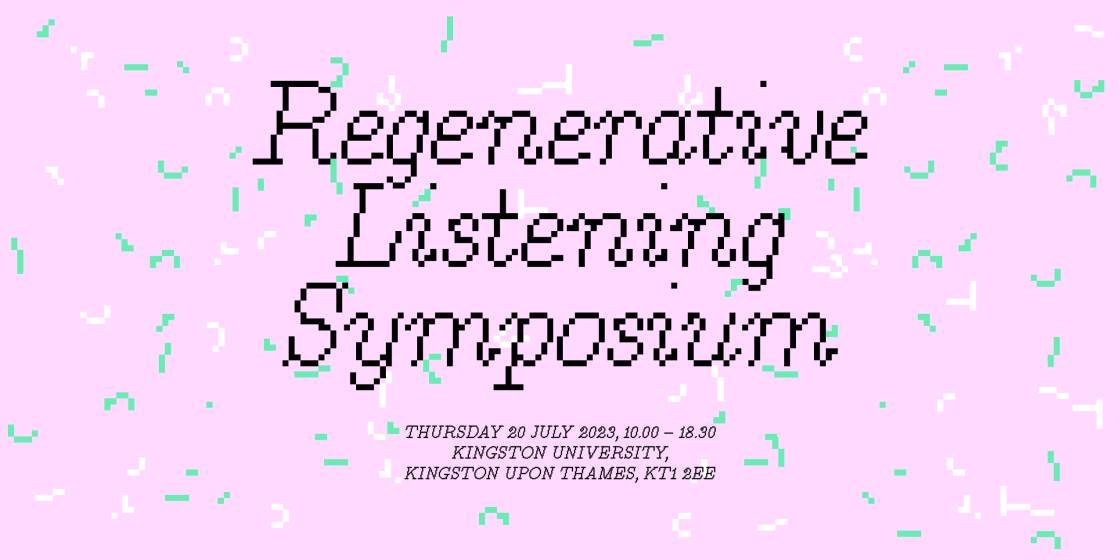
Ken Russell Book Launch and Symposium: 6 July 2023
Since 2014 there has been a gathering of critical momentum around the work of the British director Ken Russell. Russell's reputation as a provocateur of British cinema goes before him and has historically served to obscure the richness, originality, artistry and pioneering nature of his output. Recent work around Russell has striven to recuperate and restore his place within British (and world) cinema with numerous conferences, publications and PhD studies.
To celebrate the publication of The Films of Ken Russell as part of Edinburgh University Press's 'ReFocus: International Director's Series' earlier this year, and following on from what would have been Russell's 96th birthday, Kingston University is proud to host its second event about Ken Russell on 6 July 2023. This will be a one-day symposium which will showcase the most up-to-date work on Russell from early career PhD researchers, as well as discussion with two of Russell's major collaborators – his wife Lisi Russell and Roger Crittenden, editor of Russell's 1968 masterpiece Delius: Song of Summer.
ReFocus: The Films of Ken Russell considers both Ken Russell's legacy and emphasises his collaborative practices and relationships. The symposium will culminate in a panel made up of several contributors who will discuss their relationship to Russell's work, their contributions and, more broadly, Russell's work in film and television – and its global reach.'
[Image Credit: ANON for London Weekend Television, Ken Russell at Home, vintage gelatin silver print, c.1990, image 22.5cm by 29cm. Flints Auctions. Lot 291. Cover Image for Refocus: The Films of Ken Russell, Edinburgh University Press, 2023.]
- When: Thursday 6 July (Symposium: 10am to 4pm and Book Launch: 5pm to 8pm)
- Venue: In-person at Town House, Penrhyn Road, Kingston University KT1 2EE
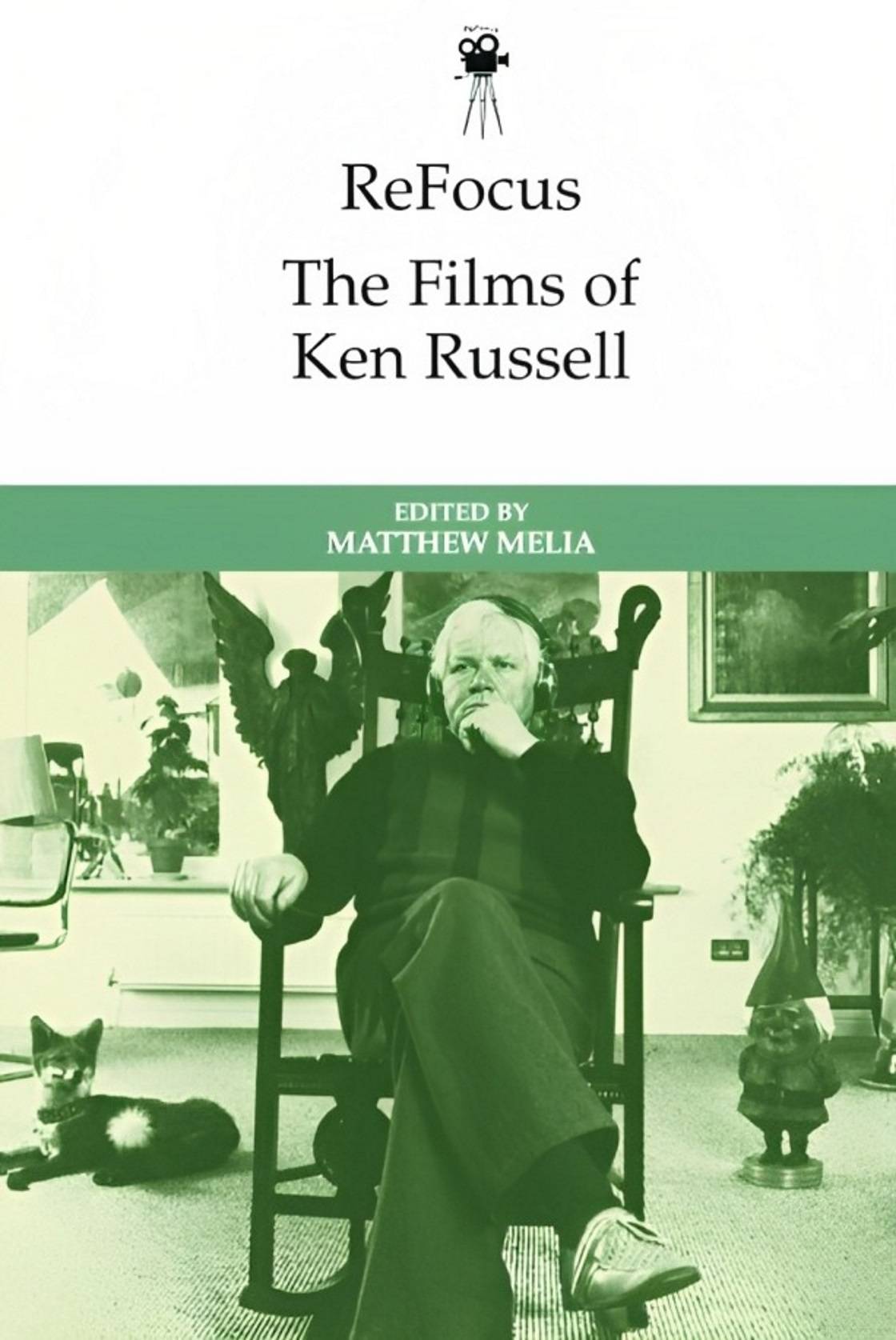
Moving Muybridge: Transatlantic Dialogues: 2-3 March 2023
International conference
This international conference showcases the latest research on Eadweard Muybridge (1830-1904), whose multi-faceted work continues to have significance across moving-image cultures, photography, digital animation and the visual arts globally. Centring on the transatlantic movements of Muybridge, his work and ideas, and the diverse Muybridge collections in the US and the UK, the conference brings together leading scholars, curators, filmmakers and artists to share knowledge about the overall significance of Muybridge holdings in both countries and to reflect on the future of Muybridge studies.
Held in Kingston upon Thames – the birthplace of Muybridge in 1830 and where he returned for the last decade of his life until his death in 1904 – the conference marks the recent relocation of Kingston Museum's Muybridge Collection to a purpose-built archive at the University's award-winning Town House building.
The proceedings open on Thursday 2 March with drinks and an early evening screening of Exposing Muybridge (2021), written and directed by the award-winning filmmaker Marc Shaffer.
Research presentations on Friday 3 March include invited Muybridge scholars, artists and curators and will conclude with a Roundtable Discussion with invited speakers.
The conference is organised by Kingston University's Visual and Material Culture Research Centre in partnership with Kingston Museum and The Stanley Picker Gallery, and is made possible through support from the Terra Foundation for American Art.
For further detail on the Conference, please visit the Stanley Picker Gallery website.
Image: Eadweard Muybridge, Zoopraxiscope Disc, c.1893. Kingston Museum and Heritage Service
- When: Thursday 2 March, Friday 3 March, 2023
- Venue: In-person at Town House, Penrhyn Road, Kingston University KT1 2EE
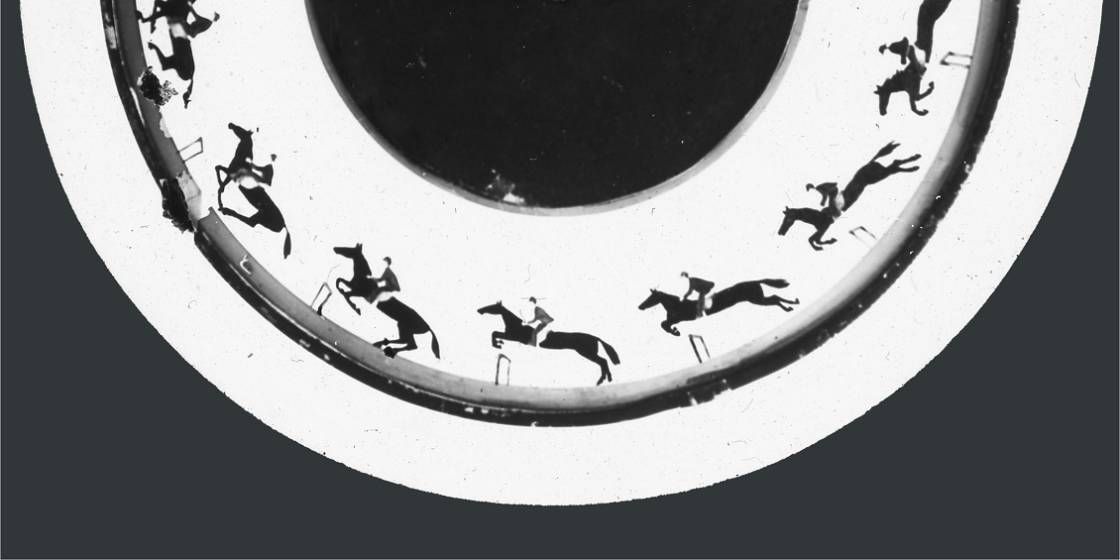
Artists' Homes in Kingston: Gordine and Muybridge
In this final event of a three-part series taking place over May–June on the theme of HOME, members of KSA's Visual and Material Culture Research Centre will be in conversation with guest speakers exploring the various homes of two former Kingston residents, the artists Dora Gordine (1895–1991) and Eadweard Muybridge (1830–1904). The conversations will be followed by a discussion and opportunity for audience questions.
Dora Gordine's Homemaking
In this conversation between art historian Jonathan Black, curator Brenda Martin and art historian Fran Lloyd, we will focus on the sculptor Dora Gordine's concept of home. Gordine had a number of different homes between 1895 to her move into Dorich House in Kingston Vale in the autumn of 1936, from Liepja in Latvia, St Petersburg in Russia and Tallinn in Estonia to Berlin in Germany, Paris in France, and Johor Bahru and Singapore in the Malay States of the British Empire. In the late 1960s, after her husband Richard Hare's death at Dorich House, Gordine considered a move to a new home to be bult for her in Indianapolis, Indiana by the wealthy Anglo-Armenian Tarzian family. The move to Indianapolis was off by the early 1970s, however, with Gordine instead focusing on trying to find a new home for Dorich House and its collection of Imperial Russian artefacts, trying to persuade the National Trust, the Victoria and Albert Museum or the National Portrait Gallery to take Dorich House on as a satellite museum.
Coming Home: Eadweard Muybridge's return to Kingston
The photographic and moving-image innovator Eadweard Muybridge was one of Kingston's most celebrated and eccentric residents, spending the first 20 and final 10 years of his life there, with the intervening 44 years spent mainly in the USA. This discussion will focus on Muybridge's relationship with Kingston and the range of places he lived after returning to the town in 1894 following his disastrous participation as an exhibitor at the Chicago World's Columbian Exposition. He lived in a succession of Kingston homes, from a room in a riverside boarding-house (‘The Chestnuts') to a large, detached house alongside Kingston's entrance to Richmond Park. He remained very active, using Kingston as his travelling base for an extensive projection tour of his work across the UK's civic halls and arts clubs, and assembling an immense scrapbook of his life's work, intended for future researchers. But much of his time in Kingston remains mysterious (Why did he tell his Kingston-based relatives he had returned there from Japan rather than, as was really the case, from New York? Was he really digging a swimming pool in his back garden at the moment of his death?). The Kingston Museum's Muybridge Collection curator Seoyoung Kim and Kingston University film historian Stephen Barber will try to unravel a few of Muybridge's Kingston enigmas.
Date: Friday 10 June 2022, 6.30 to 8pm
Location: Online.
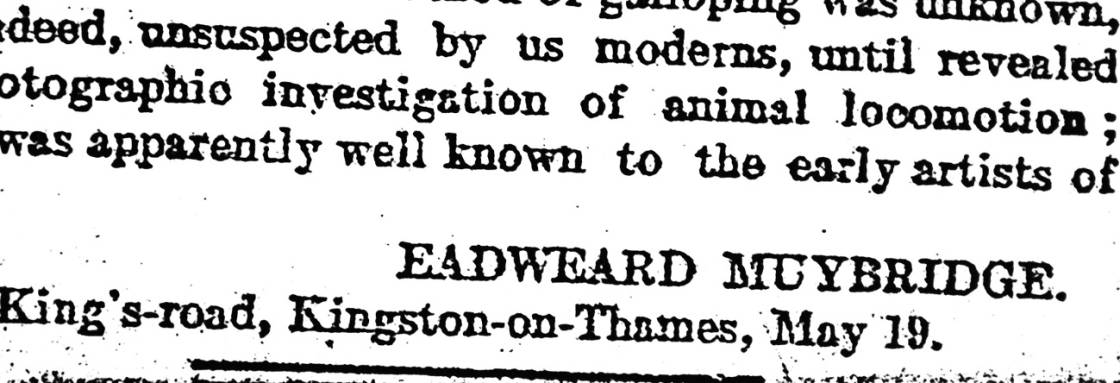
Creativity in the Lockdown Home: Crafting, Parenting, Researching
In this second event of a three-part series taking place over May–June on the theme of HOME, members of KSA's Visual and Material Culture Research Centre will be in conversation with guest speakers exploring various forms of creativity that emerged in the Covid-19 lockdown home, from crafting and its flourishing on social media to the challenges and opportunities presented by parenting while working from home. The conversations will be followed by a discussion and opportunity for audience questions.
Craft at Home: Exploring Social Media Content Creation as a Craft
Has the recent popularity in domestic craft practice been influenced by social media? While the multiple lockdowns pushed more people towards their screens to connect and many used this unprecedented time at home to learn a craft, this period only accelerated an already growing phenomenon being fuelled by the Instagram craft community. Content creation is a creative output and making successful content for social media requires a unique set of skills and know-how. From the comfort of their couch and through the palms of their hands, crafters are not only making with material, but also using their mobile phones to upload content of their making for their social media feed. Making is a way of connecting and this discussion will feature a short talk by three content creators @daisyBow_Craft, @SteelAndStich and @ArtistColette exploring connections between craft and social media, with a focus on the home as a site for this creative practice.
Child-led Creative Disruption in the Lockdown Family Home
As well as the merger of spheres and the new visibility and acceptance of children in the background during defined 'work' time in households lucky enough to be able to work from home, the Covid-19 lockdowns brought children and their rhythms to the fore of our everyday: having to rethink habits and priorities, learning to work together and play together, and embracing the collaborative meaning-making made possible by 'letting go'. This discussion-based research event between researchers and parents Anna Johnson and Lina Hakim proposes to look into this phenomenon and, drawing on insights from the perspectives of the speakers' research interests and pursuits, to consider whether it might provide an opportunity to rethink the role of children as meaningful contributors in creative/research practice.
Date: Thursday 26 May 2022, 1 to 2.30pm
Location: Online.
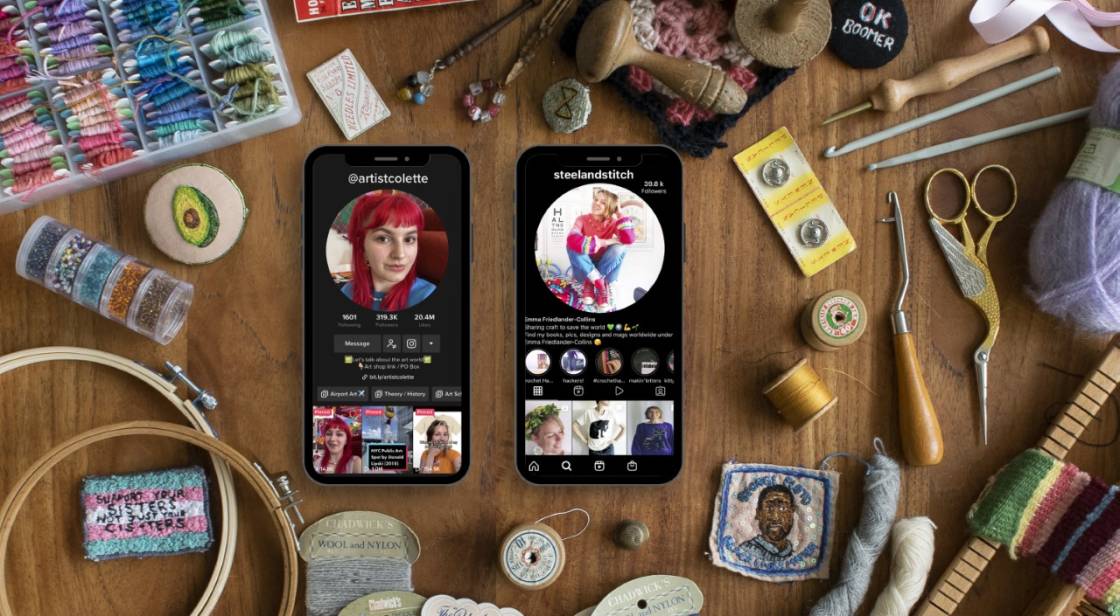
Art School Archives
Part of The Henry Moore Institute's Researching Women in Sculpture Research Season.
By the early twentieth century, women constituted over forty percent of new entrants to the sculpture profession, marking a substantial increase in the number who had completed formal training in the previous century. The establishment of the Slade School of Art in 1871 made history by offering women an art education on equal terms to their male counterparts and in some institutions women even outnumbered men among groups of art students.
Given the large number of women who undertook training in art schools, the archives of such institutions provide a crucial resource for locating women's sculptural practices. In this workshop, held at Kingston University's Archive in the RIBA Stirling Prize 2021 Town House building, speakers Fran Lloyd, Dayna Miller (both Kingston School of Art, Kingston University) and Althea Greenan (Women's Art Library) will discuss the role of art school archives in research and the structures of support provided by such institutions.
Date: Wednesday 11 May 2022, 2.15 to 6pm
Location: Town House, Kingston University, Penrhyn Road
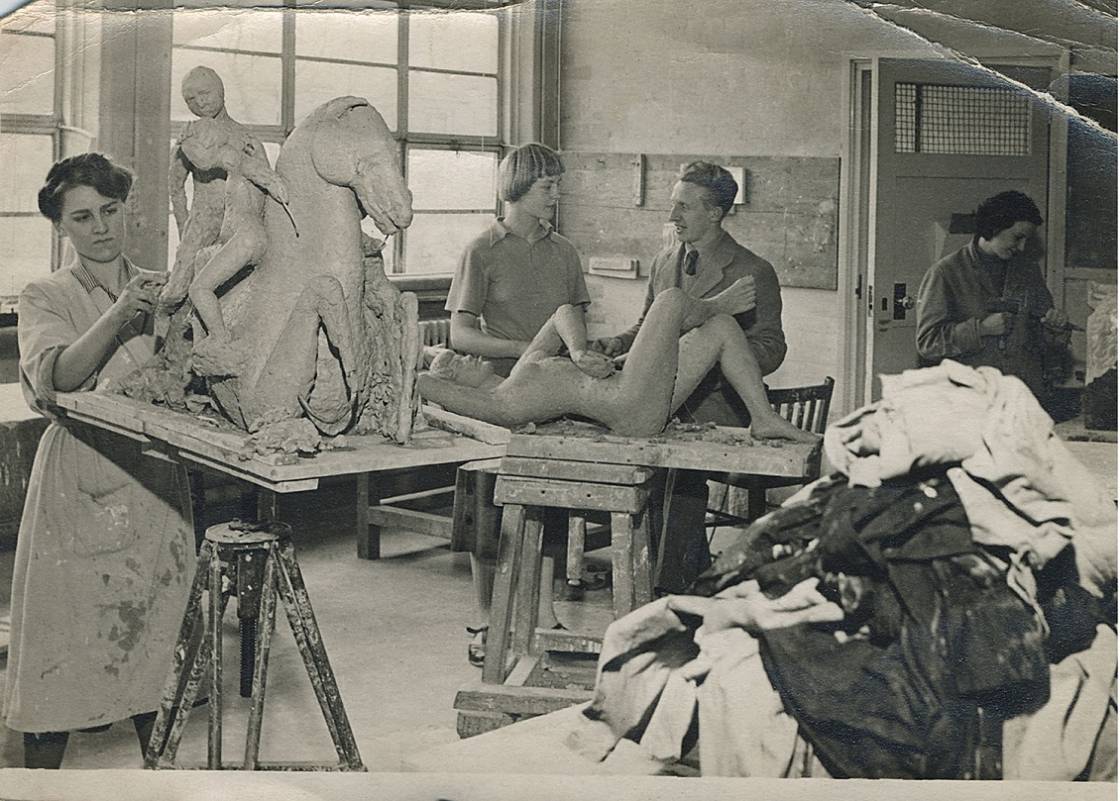
Women's Studio Museums
Part of The Henry Moore Institute's Researching Women in Sculpture Research Season.
Dorich House is the former studio-home of the sculptor Dora Gordine and her husband, the Hon. Richard Hare, scholar of Russian art and literature. Completed in 1936 to Gordine's design and now Grade II listed, the museum forms a rare example of a preserved modern studio-house created by and for a woman.
In this workshop, held in Gordine's former studio-home, Fiona Fisher (Curator, Dorich House Museum) and Jonathan Black (co-author of Dora Gordine: Sculptor, Artist, Designer) explore the practice and career of Dora Gordine. The speakers will also consider the museum's role as a centre to support contemporary women's creative practices and the representation of women in studio museums more generally.
Date: Wednesday 11 May 2022, 9.30am to 12.30pm
Location: Dorich House Museum
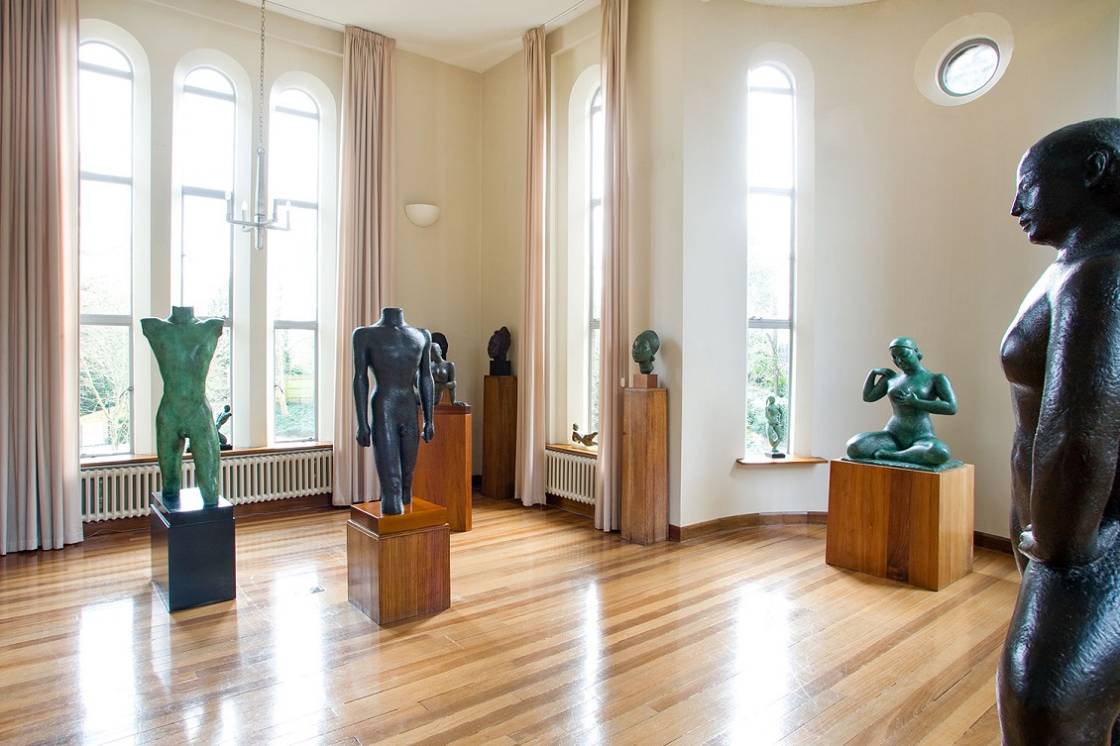
Curating Home
In this first of a three-part online public event series taking place over May–June 2022 on the theme of HOME, members of KSA's Visual and Material Culture Research Centre will be in conversation with guest speakers on the theme of curating the home. The conversations will be followed by a panel discussion and opportunity for audience questions.
'Stay Home' rapid response collecting project, Museum of the Home
The Stay Home Collection is a digital collecting project at the Museum of the Home that explores people's experiences of home during the COVID-19 pandemic. Since April 2020, the project has received over 400 submissions including questionnaires, photographs, oral recordings and diaries, all of which document how the pandemic has impacted on home life – from the challenges of isolation, home-work and home-schooling to building new relationships and community support. In this conversation between Véronique Belinga (Collections Assistant, Museum of the Home) and Annabelle Wilkins (post-doctoral researcher, Kingston University and Queen Mary), we will explore how the project has enabled the museum to engage with the changing meanings of home in its exhibitions and collections, as well as reflecting on collaborative practice with participants, creative practitioners and researchers.
Curating Home: a conversation with emerging artists
This conversation between artists Omalola Mau, Husna Memon and Helen Potkin (Associate Professor, Kingston University) will focus on a recent exhibition on the theme of home that took place at One Paved Court Gallery in Richmond in January 2022. We will explore how the curators and artists individually and collectively addressed the themes of home, identity and cultural heritage, the curatorial decision-making process and audience responses.
Date: Monday 9 May 2022
Location: This event is online.
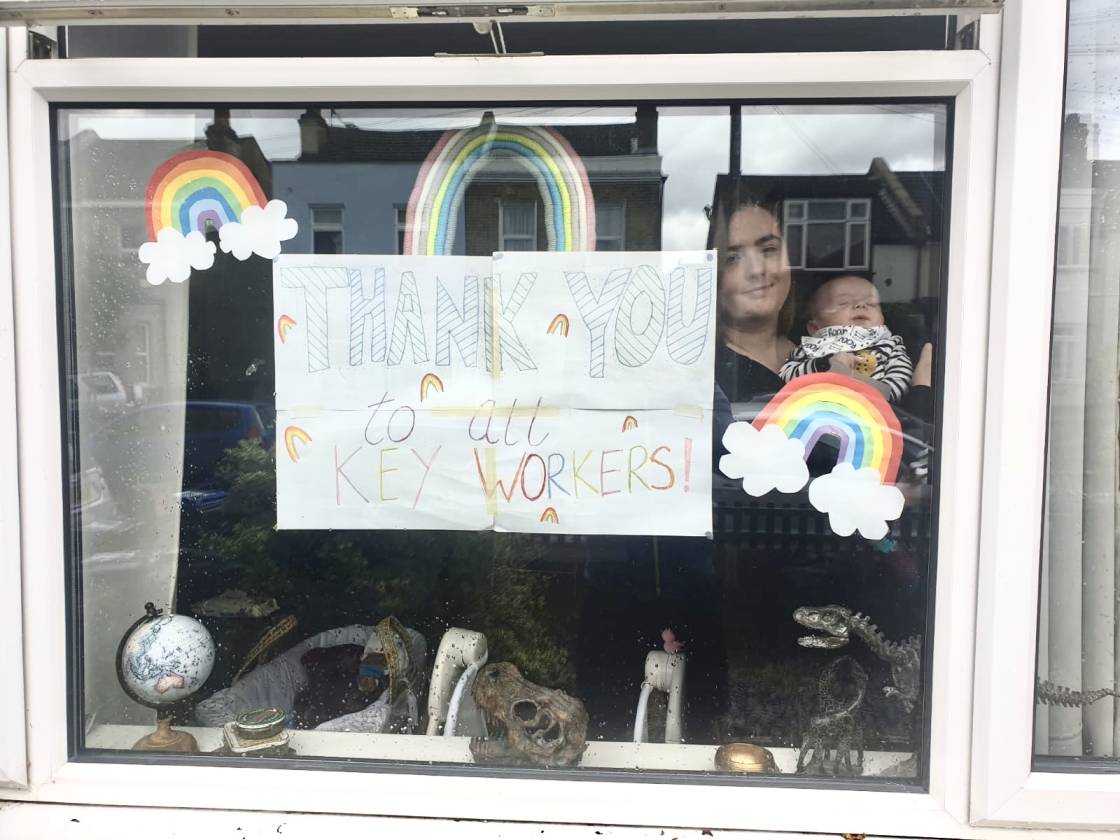
Between the Visible and Invisible
Maraya Art Centre is pleased to announce its exhibition, 'Between the Visible and Invisible' curated by Dr Azadeh Fatehrad. It features the works of a group of seven international artists that includes Pia Sandstrom (Stockholm), Adam Broomberg & Oliver Chanarin (London), Chooc Ly Tan (Paris), Nikolaus Gansterer (Vienna), Leah Fusco (London), Vladimir Nikolic (Belgrade) and Oliver Ressler (Vienna). The exhibition's opening will be held on Saturday 15 September, 2018, at 7pm and will host a live performance by Chooc Ly Tan at 8pm. The show will run until Saturday 24 November 2018.
Date: 15 September - 24 November 2018
Location: Maraya Art Centre, Sharjah, UAE
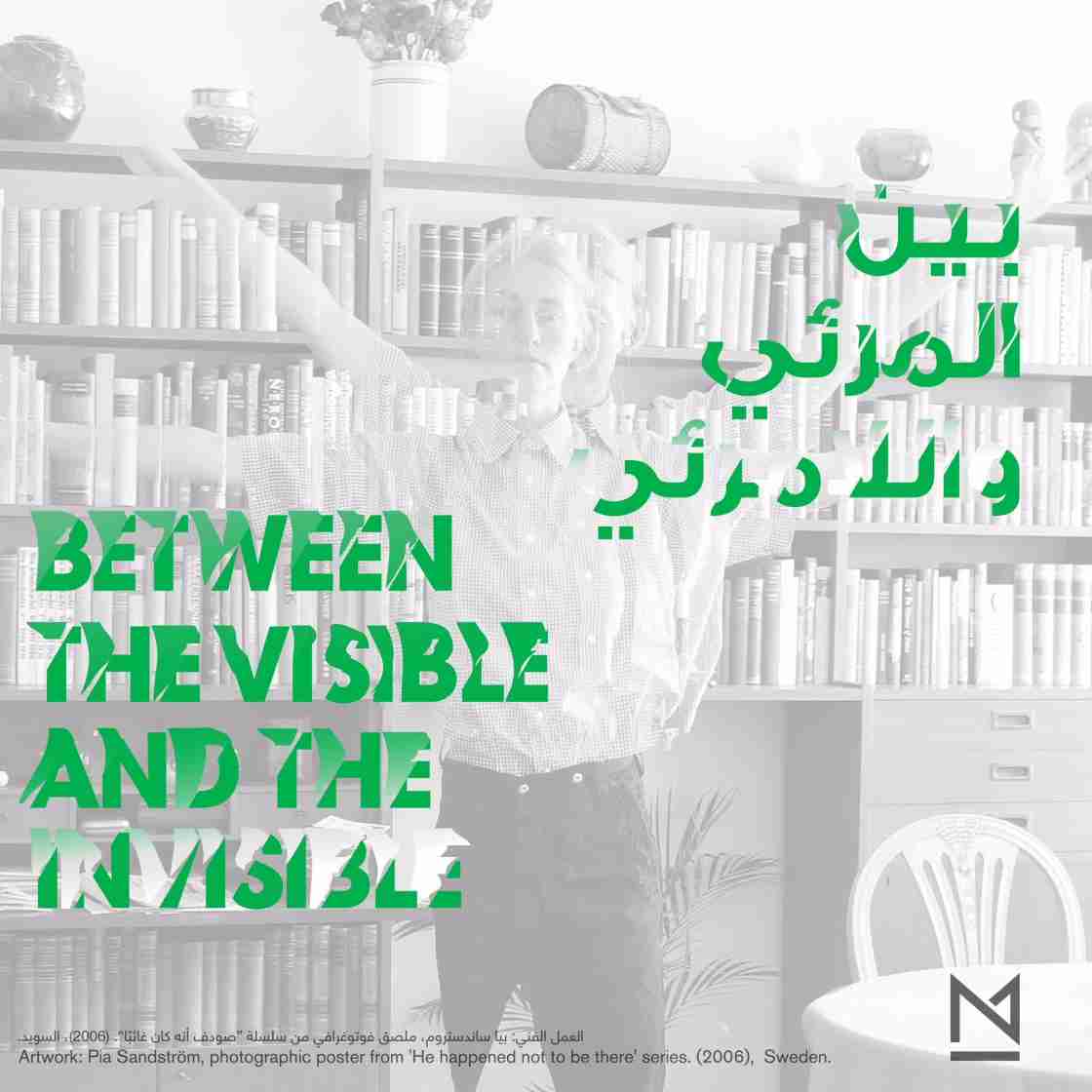
The Echo of Your Departures
The Echo of Your Departures is a multimedia installation comprising a five-channel sound and two-channel video piece reflecting on Azadeh Fatehrad's current research project Double Agency: The Formation of Diasporas.
The installation has been inspired by a series of in-depth anthropological interviews in the context of women in diasporas, and covers questions regarding gender, identity, femininity, emotion, desire, fantasy, body language, clothing norms and moral values, among other things. Fatehrad has taken fragments of the interview transcriptions and combined them with imaginary elements of self-reflection to create an ephemeral constellation (of sound and video) through which she seeks to represent the notions of uncertainty and in-betweenness in the diasporic experience.
'The Echo of Your Departures' is the result of a three-month residency at St John's College, University of Oxford in collaboration with students and staff.
Date: 14–20 June 2018
Location: the Barn Gallery, St John's College, University of Oxford
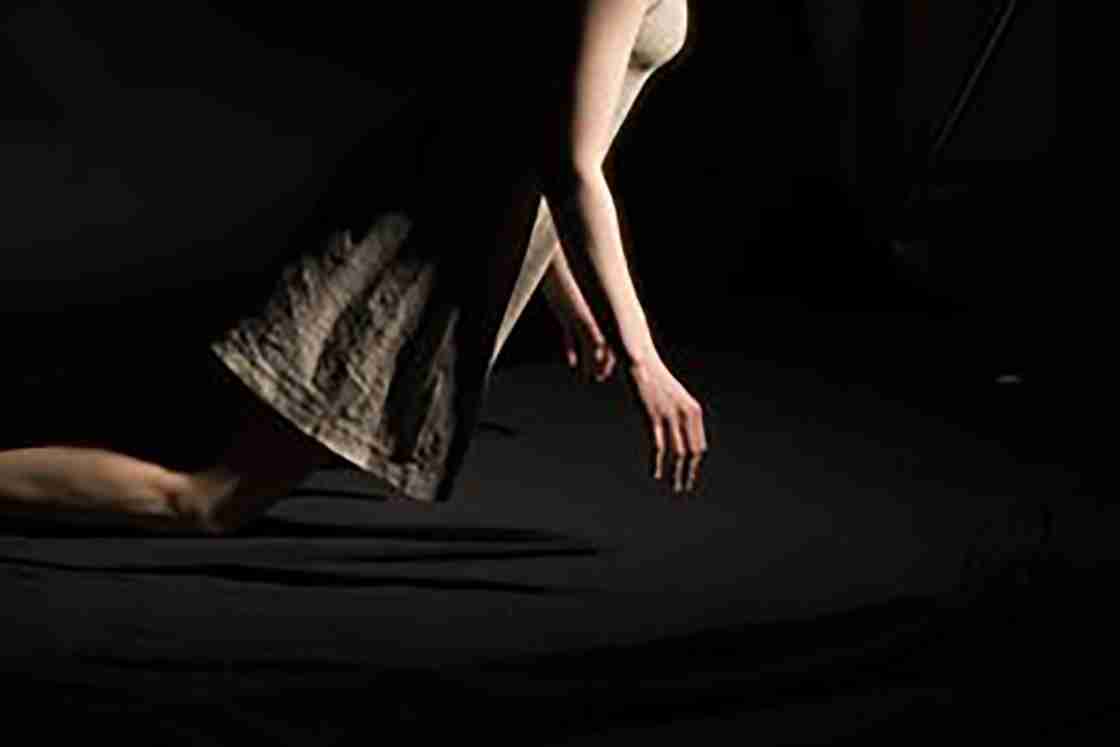

Artistic Research Will Eat Itself
The ninth edition of the SAR International Conference on Artistic Research is organised by Geoff Cox, Azadeh Fatehrad, Allister Gall, Laura Hopes, Anya Lewin and Andrew Prior in partnership with Society for Artistic Research represented by Johan Haarberg, Gabriele Schmid and Geir Strøm. The conference is hosted by the Arts Institute at the University of Plymouth with additional support from Visual and Material Culture Research Centre, Kingston University and the Contemporary Aesthetics and Technology research programme, Aarhus University, Denmark.
Conference: 11–13 April 2018
Workshops: 8–11 April 2018
Location: University of Plymouth, UK
ARTAUD
This live event will comprise readings of new translations of Artaud, as well as talks addressing specific aspects of his work.
With contributions from:
- Stephen Barber
- Ros Murray
- Samantha Marenzi
- Paul Buck
- Ed Atkins
- Richard Hawkins
Spaces limited. RSVP essential to art@cabinetltd.demon.co.uk
Date: Saturday 24 March 2018, 2.30pm
Location: CABINET, 132 Tyers Street, Vauxhall Pleasure Gardens, London, SE11 5HS
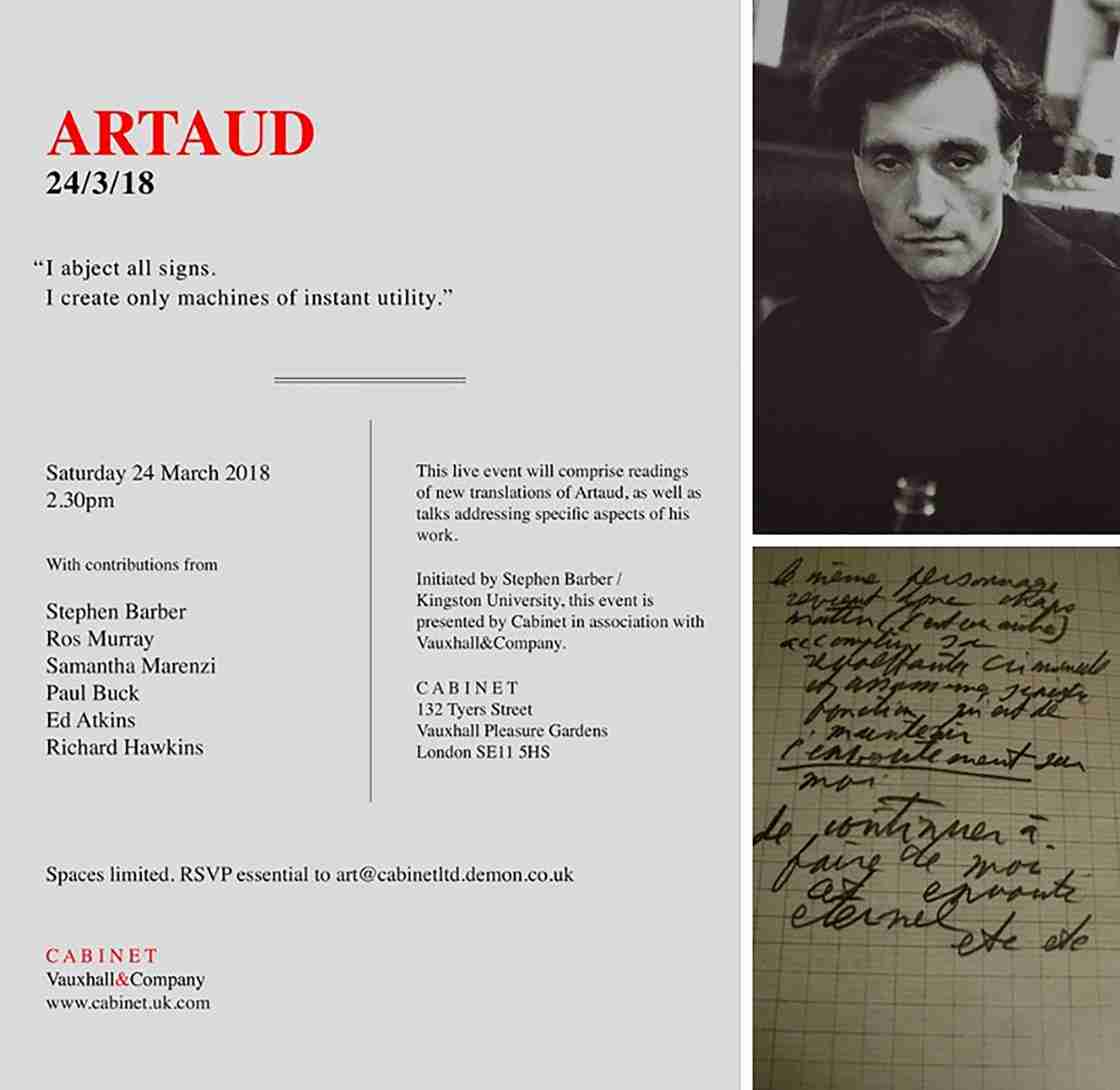
Berlin Bodies – Anatomising the Streets of the City
Professor Stephen Barber's new book Berlin Bodies presents an original conception of the corporeality of urban cultures, focusing on Berlin's scarred strata, manifested in film. The public event included screenings of rarely-seen Berlin films from the 1890s onwards and a Q&A.
The Whitechapel Gallery, 20 April 2017
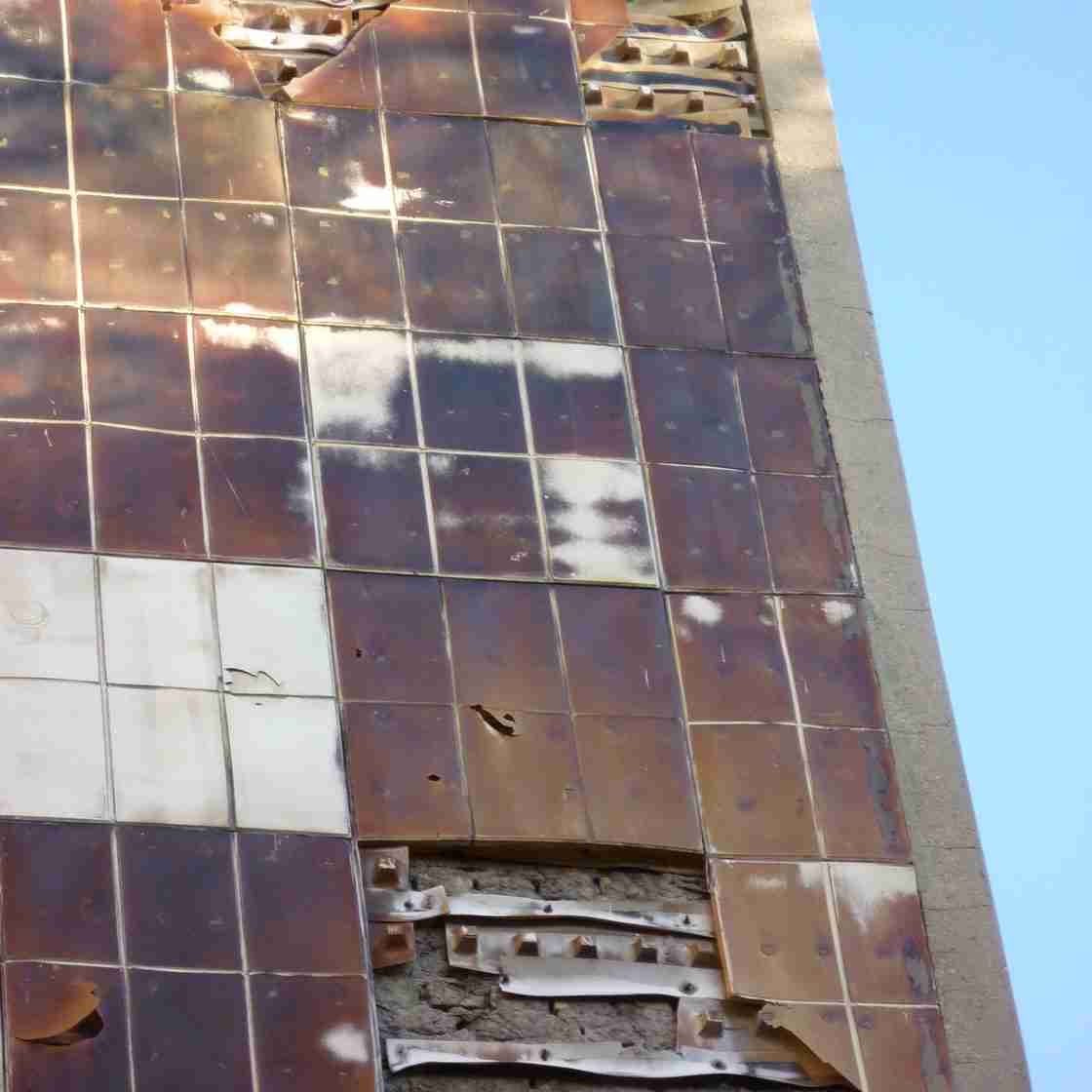
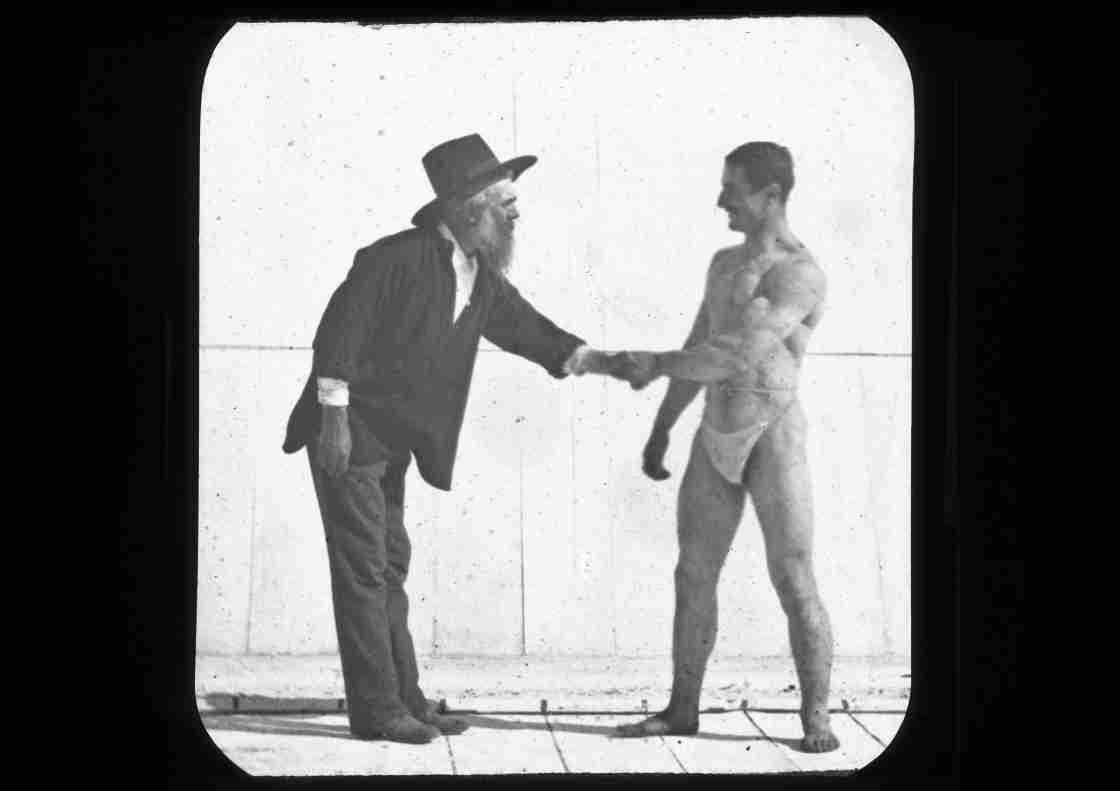
Eadweard Muybridge in Kingston, 1894-1904
New research from experts in the field drawing upon Eadweard Muybridge's personal archive of documents, projection devices and slides, bequeathed to Kingston Museum.
Speakers: Stephen Barber; Becky Beasley; Andrew Carnie; Barnaby Dicker; Patrick French; Stephen Herbert; Seoyoung Kim; Robert Knifton; Esther Leslie; Fran Lloyd; Joana Neves and Charlotte Samuels. Supported by The Paul Mellon Centre for Studies in British Art
Normansfield Theatre, Langdon Down Centre, Hampton Wick, 4 November 2016
Thinking through Making: 140 Years of Kingston School of Art
A Heritage Lottery-funded documentary film, directed by David Kew, focusing on the history of Kingston School of Art. Panel discussion led by project leaders, Professor Fran Lloyd and Dr. Robert Knifton, focused on the art school experience. Speakers: John Carter RA (Fine Art alumnus), Mike Nelson (Professor of Fine Art) and Elinor Renfrew (Head of Fashion).
London Film Premiere at the ICA, Friday 6 November 2015
